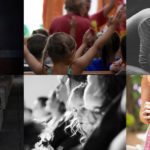Our ability to heal divides is getting harder. The problem is deeper than where we get our news or what social networks we use. The problem is in our ability to relate to one another.
As we narrow our sources of information and social networks, we are losing a skill necessary for human flourishing. As we disengage from those who don’t think like us, we’re not encountering different ideas. Our ability to understand each other is atrophying.
Some divides are over more than different ideas; they are the result of abuse—physical, mental, spiritual, emotional, sexual. Abuse calls for a more robust response than is the subject of this editorial.
Divides over political, social and religious differences, however, can begin to be healed through understanding each other. Instead, our response to these kinds of divides increasingly is to pull away. In doing that, we are weakening our ability to connect and strengthening the impetus to divide.
Here is an example of how quickly we are pulling farther apart over political differences. Following the 2020 presidential election, Fox News appeared to lose millions of viewers to networks considered more conservative. At the same time, some Facebook and Twitter users encouraged followers to move with them to Parler—a social platform seen as more friendly to conservative views and whose users nearly doubled in the week following the election.
One can assume similar trends are happening across the political spectrum, that platforms are becoming more partisan as users move from platform to platform seeking like-minded networks.
Parting over political differences
When we talk about people moving from one popular social platform to another in search of a more like-minded network, we are not talking about a nameless and faceless crowd. We are talking about our parents, friends, co-workers or fellow church members. We are talking about people we know, love and care about.
When someone we know in “real life” changes social media platforms to find a more like-minded network, we lose more than the relational connection. Our ability to understand one another begins to atrophy as a whole set of words and meanings disappear from our experience of the world.
Our social media feeds have been echo chambers absent of differing thoughts and views for a while. As these echo chambers have solidified, we have found ourselves talking past each other more frequently—if we even talk toward each other at all.
We jump to conclusions faster. We see words and images and make snap judgments and assumptions. We attribute meanings to others without really paying attention or listening. We react, and many of our reactions question the other’s God-given value.
Healing divides is hard work
Our propensity to differ is common to the point of normal. It’s a truth about ourselves we understand very well.
Most of our differences usually are easy enough to repair if we can work through pride, disappointment and other tendencies conquerable through repentance, forgiveness and reconciliation. That sounds flippant, but the reality is such work can be grueling and even unsuccessful.
A recent addition to the challenge of healing divides is the proliferation of digital platforms. These platforms allow us to craft reality by seeing only what we want and not seeing what we don’t want. The apparent freedom from unwanted messages is not without its cost.
Losing the ability to heal
We already misunderstand one another, but as long as we continue to come together in the same places—like churches and social media networks—we still have the opportunity to understand each other if we will listen to each other. In places like churches and social media networks, we still can encounter each other’s differences and the ways those are communicated.
But once we disconnect, once we sequester in ever-narrowing echo chambers, we no longer encounter differences in thinking, language and ways of communicating. When we no longer have that thread of connection, our minds begin to let go of the ability—the need—to make sense of one another in the real world.
Like muscle or skill, we lose what we don’t use. Without the ability to understand people different from us, it will be harder and harder to heal the divide—including the divide among brothers and sisters in Christ.
The healing we need
Any follower of Jesus should be concerned about this. Jesus’ first group of followers consisted of political, social and religious opposites. They didn’t always get along, but Jesus was their common bond, and after him, the Holy Spirit.
If Christians today intend to call ourselves “followers of Jesus,” then this first group of Jesus-followers must be a model for us. Like them, we must keep Jesus as our common bond, and after him, the Holy Spirit. In them, our political, social and religious differences are overcome.
We need to resist the tendency to divide over political, social and religious differences. We need to stay in networks where we encounter others with whom we disagree.
We need to regard each other as created and valued by God. We need to practice patience in listening to each other, and kindness and gentleness in responding to each another.
In our bitterly divided world, we need to heal.
Eric Black is the executive director, publisher and editor of the Baptist Standard. He can be reached at eric.black@baptiststandard.com or on Twitter at @EricBlackBSP. The views expressed are those solely of the author.















We seek to connect God’s story and God’s people around the world. To learn more about God’s story, click here.
Send comments and feedback to Eric Black, our editor. For comments to be published, please specify “letter to the editor.” Maximum length for publication is 300 words.